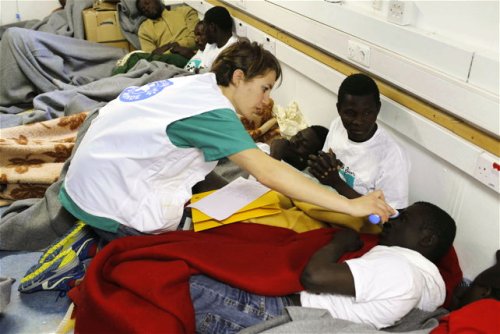Saturday, April 16
Favila, the coordinator of Doctors of the World, comes to wake me up at 5am, "Celine? Rescue in an hour!" On the Aquarius we distrust hourly forecasts, as they have sometimes been greatly underestimated. The call was received around 3:30am. We are worried because it’s the first time we have gone on a night rescue. But finally and fortunately, the sun quickly peeks out and we can benefit from the first light of the day.
This is the usual boat: a zodiac considered a "sea toy", with 116 people, including 20 women and one 15-month-old girl. Some were shot and wounded ten days ago. The group left last night. They are all in shock.
All are on board when we are informed that we have to receive on the Aquarius another group that was take in hand by an Italian military vessel. We must act quickly. We are pleased that we are beginning to benefit from the little experiment: we are better organized! We take the women and children inside, and the weakest into another room; the others remain outside. The protocol requires taking everyone’s temperature, but it’s too cold and even on me, the thermometer showed 35.3 °. Registration, distribution of blankets and kits, and finally food.
Whereas in our previous rescue we had kept the people almost three days, now we will have them only for three hours. Maryse, the other nurse, and I were almost frustrated by not having had time to listen to them! The transfer over, we use the rest of our energies to get things in shape for the next rescue. The sea is rough; we are almost sure we will not have any rescues on the following day.

Sunday 17 April
After midday we expect no more rescues: the sea is not good and the time is "past." The program for the day: rest. We are all exhausted from yesterday. But at 5pm, the alert is given for a rescue. We reflect and prepare for the worst: the migrants have remained in the water a long time and we will certainly find some dead.
The zodiac is not in the expected position. We are three ships in search of it. The liner spotted it first, but it is not well equipped and not prepared for a rescue. It is up to us to act. We can hardly see the zodiac: it is already sinking. It’s terrible. And the sea was not on our side, with two-meter-high waves. We were able to save 108 people, including five women. The rescuers found six bodies in the bottom of the boat. Others drowned before their eyes. And many more drowned on the way. They had left at 9am. An hour later, the zodiac had already begun to deflate.
This time, the life jackets had scarcely been distributed for lack of time. The migrants were in great distress; some even went into a frenzy and we had to administer sedatives. Many boarded completely naked. Those who still had some clothes were soaked from head to foot. Personally, I was in the shelter and I received the weakest people. We had to remove all their clothing so they could get warm but also because they were full of diesel fuel.
After the distribution of survival blankets, I tried to put them side by side so that they could warm up. It was hard: many had legs and private parts burned by diesel fuel. Some were screaming in pain and I could not do anything because it was first necessary to ensure the survival of as many people as possible. A man was looking for his wife. I quickly realized that she was unfortunately not with us.... We also had to isolate two youths who had each seen their own brother drowned.
This time too, a young man had received many bullets the previous week, including one that passed close to his lungs. Fortunately, this time there were no children on board — except those in their mothers’ wombs. I am relieved that we are heading towards Lampedusa, because that is the place we can reach the quickest.
Today, we landed at 1pm. The faces were still marked by sadness and distress . But finally some smiles appeared. If only the people they meet would welcome them kindly, gently and delicately. They have already suffered so much!
To reply to a question often asked: the majority of migrants that we receive are between 15 and 25 years old. Some are older, some younger. Journalists ask permission before taking a picture or taking their testimony. We try to ensure this as much as possible and also that the presence of journalists not be too much of a burden for the migrants. At the same time, journalists were invited to help us bear witness to what is really happening in the Mediterranean.
Now we are heading towards Trapani, Sicily, to rest a little because some of us are still shocked, especially those who have seen migrants drowned and dead bodies. I entrust the migrants to your prayers and your thoughts. And I also want to entrust to you all the hardened hearts so that they may become softer and more attentive to the suffering of others.
 TAIZÉ
TAIZÉ